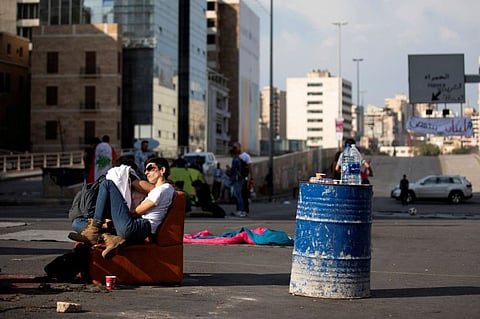Lebanon protesters block roads to keep revolt alive
Security forces make a new attempt to reopen the roads

Beirut: Lebanese demonstrators set up barricades and parked cars across key roads Monday to protest corruption and press their demands for a radical overhaul of their country’s sectarian political system.
Defying pleas from Lebanon’s top leaders, protesters sought to keep the country on lockdown by cutting off some of the main thoroughfares, including the main north-south highway.
A poster urging motorists to block roads with their cars started circulating on social media on Sunday.
By Monday morning, some major routes were closed off by hundreds of angle-parked vehicles, others by groups of protesters sitting on the road.
The Lebanese security forces made a new attempt at reopening the roads as the country faced more paralysis after 11 days of paralysis.
The army and the country’s top security agencies had agreed at the weekend to a military-led plan to clear roadblocks, but their efforts have been met with resistance from demonstrators.
On Sunday, tens of thousands of protesters joined hands nationwide to form a 170-kilometre (105-mile) human chain stretching from Tripoli in the north to Tyre in the south.
The event drew Lebanese of all ages and backgrounds, many of them draped in the national cedar flag.
Organisers said the event symbolised a national civic identity that has emerged since the start of the protests on October 17.
The unprecedented mobilisation was sparked a proposed tax on voice calls via messaging apps, but quickly morphed into a massive grassroots push to drive out a political elite which has remained virtually unchanged in three decades.
The protesters are demanding more freedom, better services and an end to corruption and sectarian politics, among other things.
Lebanon’s political leaders have appeared shell-shocked, trying simultaneously to express sympathy for the protest movement while warning of chaos in the case of a power vacuum.
Traders banned from withdrawing significant sums from banks
Meanwhile, a Lebanese state prosecutor on Sunday banned traders and money exchangers from taking significant amounts of physical dollar currency out of the country at air and land borders, state news agency NNA said.
The order, which it said was issued by Public Prosecutor Ghassan Oueidat, imposed the ban until the central bank determines a new mechanism for regulating such transfers, NNA reported.
People had previously been able to take large sums of dollar cash out of Lebanon with a permit from customs authorities.
“The customs directorate will subject the transfer of funds to the mechanism that Lebanon’s central bank will determine,” NNA said.
Eleven days of nationwide protests have caused banks to be closed for eight working days.
The country’s banking association said banks would remain closed until stability is restored, amid growing fears that a rush to withdraw savings when they reopen could deplete dwindling foreign currency deposits.



![Oman’s Maritime Security Centre confirmed four crew members injured. [Illustrative image. ]](http://media.assettype.com/gulfnews%2F2026-03-01%2Fv5np7wj5%2FOil-tanker.jpg?w=320&auto=format%2Ccompress&fit=max)